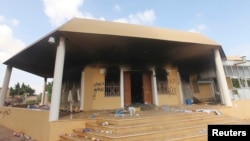WASHINGTON —
A top Republican lawmaker is disputing a report in the New York Times asserting no connection between al-Qaida and the 2012 attack in Benghazi that killed America’s ambassador to Libya.
The attack that overran the U.S. compound in Benghazi and left four Americans dead, including Ambassador Christopher Stevens, has been the focus of intense congressional scrutiny and persistent Republican allegations of incompetence and a cover-up by the Obama administration. Now, a months-long investigation by the New York Times concluded that the administration was at least partially correct when it claimed the attack was spontaneous and triggered by local outrage over an American-made video denigrating Islam.
The newspaper asserts that local Islamic fighters took part in the assault but they had no ties to al-Qaida or any international terrorist group.
Appearing on the Fox News Sunday television program, the chairman of the House Intelligence Committee, Republican Mike Rogers, said the Times got the story wrong.
“There was aspiration to conduct an attack by al-Qaida and their affiliates in Libya; we know that. The individuals on the ground talked about a planned tactical movement on the [U.S.] compound. All of that would directly contradict what the New York Times definitively says was an exhaustive investigation,” said Rogers.
Also appearing on Fox News Sunday was Democratic Congressman Adam Schiff, who said the Times story paints a picture of complexity and in no way excuses inadequate security at the U.S. outpost in Benghazi.
“I do not think the New York Times report is designed to exonerate security lapses within the State Department that left our people vulnerable. I do think it adds some valuable insights. The intelligence indicates that al-Qaida was involved, but there were also plenty of people and militias that were unaffiliated with al-Qaida that were involved. I think the intelligence paints a portrait that some people came to murder, some people came to destroy property, some merely came to loot, and some came, in part, motivated by those videos,” said Schiff.
The Times said a U.S. "fixation" with al-Qaida possibly distracted intelligence officials from "more imminent threats," including local anti-Western militia leaders in Benghazi. The newspaper report was based on extensive interviews with Libyans in Benghazi.
The attack that overran the U.S. compound in Benghazi and left four Americans dead, including Ambassador Christopher Stevens, has been the focus of intense congressional scrutiny and persistent Republican allegations of incompetence and a cover-up by the Obama administration. Now, a months-long investigation by the New York Times concluded that the administration was at least partially correct when it claimed the attack was spontaneous and triggered by local outrage over an American-made video denigrating Islam.
The newspaper asserts that local Islamic fighters took part in the assault but they had no ties to al-Qaida or any international terrorist group.
Appearing on the Fox News Sunday television program, the chairman of the House Intelligence Committee, Republican Mike Rogers, said the Times got the story wrong.
“There was aspiration to conduct an attack by al-Qaida and their affiliates in Libya; we know that. The individuals on the ground talked about a planned tactical movement on the [U.S.] compound. All of that would directly contradict what the New York Times definitively says was an exhaustive investigation,” said Rogers.
Also appearing on Fox News Sunday was Democratic Congressman Adam Schiff, who said the Times story paints a picture of complexity and in no way excuses inadequate security at the U.S. outpost in Benghazi.
“I do not think the New York Times report is designed to exonerate security lapses within the State Department that left our people vulnerable. I do think it adds some valuable insights. The intelligence indicates that al-Qaida was involved, but there were also plenty of people and militias that were unaffiliated with al-Qaida that were involved. I think the intelligence paints a portrait that some people came to murder, some people came to destroy property, some merely came to loot, and some came, in part, motivated by those videos,” said Schiff.
The Times said a U.S. "fixation" with al-Qaida possibly distracted intelligence officials from "more imminent threats," including local anti-Western militia leaders in Benghazi. The newspaper report was based on extensive interviews with Libyans in Benghazi.






